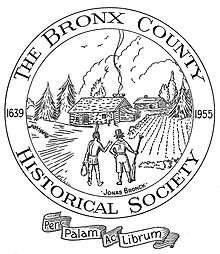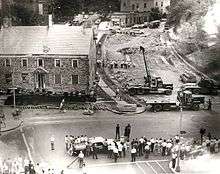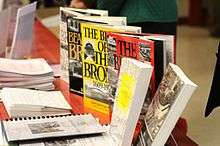The Bronx County Historical Society

The Bronx County Historical Society, founded in 1955, is a private, non-profit, educational and cultural institution chartered by the NYS Board of Regents. The Society, the historical agency for The Bronx, a county of New York State and a borough of the city of New York, is dedicated to the collection, preservation, documentation and interpretation of the history of The Bronx from its earliest historical references in the 17th century through the present. The Society disseminates information to the general public, students, historians, urban planners and staff of other museums and libraries on the historical, social and economic development of The Bronx. It utilizes its collections in exhibitions, both in-house and traveling, historical research, production of publications, educational and cultural programming, and in the operation of a Research Library, The Bronx County Archives and two national landmark historic houses as museums, the Edgar Allan Poe Cottage and the Valentine-Varian House/Museum of Bronx History.
History

It all started in September 1955 with a simple question a reader of the “Bronx Bandwagon” column in the New York Post Bronx edition posed to the journalist Burt Gumpert: “Why is there no Bronx Historical Society?”[1][2]Recognizing a need for such an institution, Gumpert asserted that a historical society will be created by the end of that year. Soon enough, Gumpert, along with another seven individuals, met at the dental office of Dr. Theodore Kazimiroff to begin The Bronx County Historical Society.[3] The Society began to give public lectures to discuss object collections, local history, and to build up support from fellow Bronxites. So entertaining and informative were these lectures that the audience size began to increase, prompting The Society to seek larger venues. After outgrowing the West Farms branch of the New York Public Library, The Society briefly operated in other libraries and churches, Fordham University and Lehman College. Walking tours became very popular at this time, while an annual journal began with its first printing in 1964, making it one of the premier history periodicals in the tristate region today. Then, in 1965, the historic Valentine-Varian House on Bainbridge Avenue was donated to The Society by William C. Beller, thus establishing the first permanent headquarters of The Bronx County Historical Society.[4][5][6] Three years later, The Society opened the house as the Museum of Bronx History, the borough’s very first museum celebrating its historic heritage.
Expansion and Growth
The Society continued to expand by taking on other historic sites and facilities. In 1975, The Society began to administer the Edgar Allan Poe Cottage, where the famous American writer spent his last years.[7] Then in 1982, The Society once again expanded into another building on Bainbridge Avenue and opened it as a research library and administrative offices.[8] The Society came into possession of another building just two doors away on Bainbridge Avenue. The latest building was opened as The Bronx County Archives in 2001.[9][10] Today, The Bronx County Historical Society is considered to be one of the most active historical societies in the state of New York.[11][12]
The Society's Ongoing Mission
The Society continues to collect all sorts of information such as books, reports, photographs, archival records, objects, and other artifacts about The Bronx. It then makes this information available to thousands of people each year, in its Research Library and Archives, by mail and over the phone, and via the Internet.[13] The Society also works with the Bronx Library Center and Branch Libraries in sharing these resources. As for the future, The Bronx County Historical Society is expected to start their digitization project in 2017.[14][15]

For over 50 years, The Bronx County Historical Society has honored Bronx High School Valedictorians with an awards ceremony held at the Museum for Bronx History. The event offers the opportunity to accentuate the positive in The Bronx and to meet and honor the borough's future leaders.[16]
The Society is also the largest publisher of books and articles about The Bronx and produces the oldest continuously published historical periodical in The Greater City of New York, The Bronx County Historical Society Journal.


Partnerships and Special Projects
The Bronx County Historical Society is a joint sponsor with Fordham University’s Department of African and African American Studies of The Bronx African American History Project.[17][18]Over 230 oral histories have been done so far, four major archival collections accessioned, and many books, articles, and exhibitions have been produced.[19] The oral histories are being cataloged and will be available to the public at The Bronx Archives Building.[20] In 2009-2010, the Historical Society is continuing an Archival Survey of the records of African Americans in The Bronx.
In 2010, The Society launched The Bronx Latino History Project, which highlights Latinos who lived or contributed to The Bronx throughout its history.[21][22]Because the Latino population is the largest and fastest growing ethnic group in the borough since the mid-20th century (comprising more than half of the county's population),The Society’s education department is continuing the process of increasing it's collections to reflect The Bronx's current diversity.[23] With the assistance of community organizations and certain devoted individuals, The Society will continue to fulfill its mission to preserve and share information that highlights major turning points in Bronx history.

References
- ↑ Twomey, Bill (January 10, 2008). "Bert Gumpert, pioneer Bronx historical column". Bronx Times Reporter.
- ↑ Ultan, Lloyd (Winter 1967). "The Vital Historians: the Story of The Bronx County Historical Society". Bronxboro.
- ↑ "Historical Society Is Open". New York Post. May 25, 1964.
- ↑ William, Neugebauer (November 6, 1961). "Historic House to Be Moved To Park, Opened as Museum". The New York Daily News.
- ↑ "Vandals Battering 1775 House Planned for Museum in Bronx". The New York Times. August 22, 1963.
- ↑ "Reserved for Bronx of Tomorrow, City Clears Way to Move Crumbling Varian House". The New York Times. November 7, 1964.
- ↑ "No pits in Poe home, keeper says". The New York Times. June 5, 1977 – via Proquest.
- ↑ "First Visitor at the New Theodore Kazimiroff Research Library and Archives". The Riverdale Press. January 6, 1983.
- ↑ Agnes, Zawadski (October 18, 2001). "Bronx archives building brings the past to light". The Riverdale Press.
- ↑ "Bronx County Historical Society to formally open new Archives center". Bronx Times Reporter. October 18, 2001.
- ↑ "Hunts Point walking tour offers glimpse at history". News 12, The Bronx. March 26, 2016. Retrieved November 10, 2015.
- ↑ "Bronx Historical Society Celebrates 60 years". News 12, The Bronx. February 3, 2015. Retrieved November 28, 2016.
- ↑ Zoe, Rosenberg. "In Photos: Exploring the Bronx County Historical Society's Hidden Archives". Curbed New York. Curbed New York. Retrieved 28 November 2016.
- ↑ Clarke, Erin. "Bronx Historical Society to be Revamped, Jump into the Future". Time Warner Cable News. Time Warner Cable News. Retrieved 28 November 2016.
- ↑ Cruz, David. "BCHS Embarks on Digital Preservation of Relics" (PDF). Norwood News. Norwood News. Retrieved 28 November 2016.
- ↑ "Bronx County Historical Honors Top Students". Bronx Times. June 17–23, 2010.
- ↑ Wall, Patrick (April 5, 2013). "Ten Year Project Records Story of Blacks in the Bronx". DNA Info. Retrieved November 13, 2016.
- ↑ "Bronx African American History Project". Fordham University. Retrieved November 12, 2016.
- ↑ Gonzalez, David (October 22, 2004). "Lost and Found: An Era in The Bronx". The New York Times. Retrieved November 14, 2016.
- ↑ "Bronx Jazz Scene Back in Swing at Historical Society". Norwood News. December 14, 2010. Retrieved October 1, 2015.
- ↑ Samuels, Tanyanika (October 18, 2011). "Injecting life into Bronx's Latino history". The New York Daily News. Retrieved November 1, 2016.
- ↑ "Bronx Latino Project Celebrates Hispanic Heritage Month". News 12, The Bronx. September 16, 2013. Retrieved November 3, 2016.
- ↑ "QuickFacts - Bronx County (Bronx Borough), New York". United States Census Bureau. Retrieved November 12, 2016.